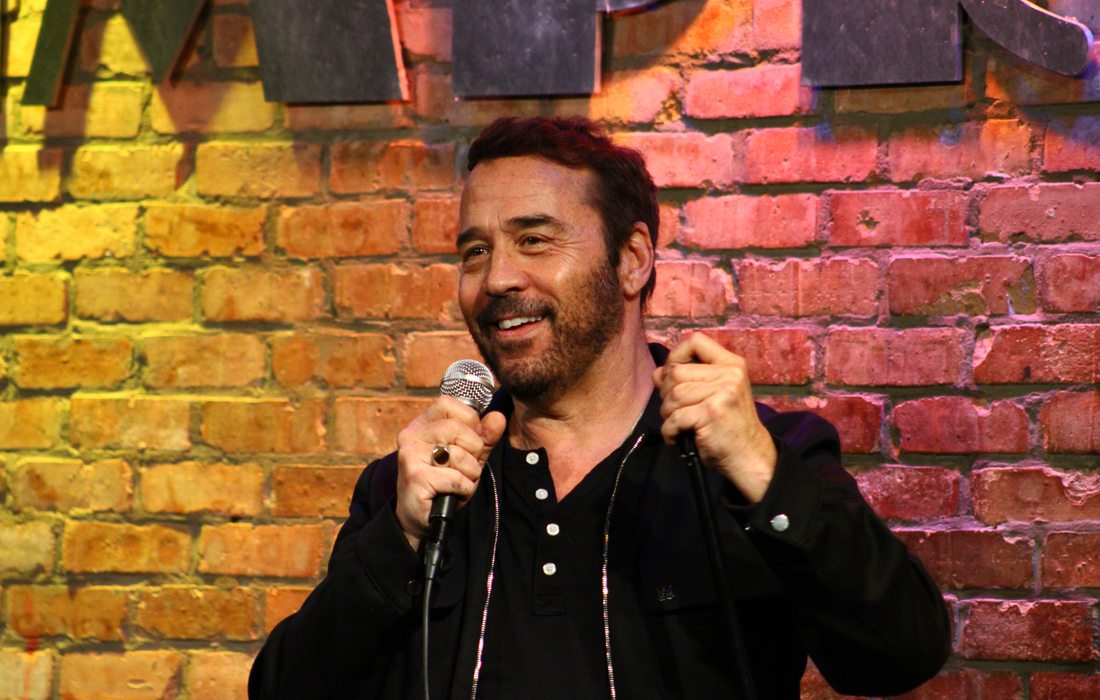
Things to Do
Q&A with Jeremy Piven
Catch Jeremy Piven this weekend, March 28 and 29, at the Blue Room Comedy Club in Springfield, Missouri. We spoke to Piven ahead of his first ever Springfield show.
by Jamie Thomas
Mar 2025

For most people, Jeremy Piven is probably most recognizable as Ari Gold, the foul-mouthed and frenetic agent in the TV series and movie Entourage. Others might recognize him from elsewhere on his lengthy IMDb credits list: Movies like Singles, Serendipity, Grosse Point Blank, Black Hawk Down, Edge of Tomorrow and more, not to mention numerous other TV shows, sitcoms and voice acting roles. Piven, who grew up in Chicago, is the son of Joyce and Byrne Piven, actors and drama teachers who founded Evanston, Illinois's Piven Theatre Workshop, and younger brother to Shira Piven, herself an accomplished director. Piven has been getting up on stage since he was 8 years old, and you can see him on stage this weekend performing stand-up at the Blue Room Comedy Club for the first time on Friday, March 28 and Saturday March 29. Check his official website for full tour dates.
Piven also has a new movie on the way—one that's been in the works for 15 years—directed by his sister Shira Piven and based on a short story by Arthur Miller.
About The Performance
The Performance tells the story of Harold May, a Jewish American tap dancer who is given what might be the opportunity of a lifetime in 1937 Berlin. The film is already generating positive buzz—for Jeremy Piven's performance, the performance of his co-star Robert Carlisle, and Shira Piven's handling of Arthur Miller's material—as an impactful and timely story. You can see reviews for the film at Deadline and Variety, and watch the trailer here.
We spoke to Piven ahead of his Blue Room show about his stand-up comedy, The Performance and tap dancing.
Q&A with Jeremy Piven
417 Magazine: Is there a difference doing stand-up as yourself versus performing in character as an actor?
Jeremy Piven: That's one of the beautiful things about stand-up. It's really you up there and it's your truth. You're not inhabiting a character. You are yourself, and it's your take on what's funny and how you see the world. I think one of the many reasons people are gravitating toward [stand-up comedy] now is to have someone on stage attempting to make sense of all this madness around us. It's a bit of escapism for people who want to get away from everything that's going on and laugh and share some time with me. I don't really care why they come to see me. It may be some people who believe that they are Ari Gold and they wanna scream out stuff and want me to really witness their Ari Gold energy. Maybe they think that I am that character, but whatever the reason they're coming, it doesn't matter to me. I just want them in that theater so I can make them laugh.
417: Who are your favorites or influences in stand-up comedy?
J.P.: Growing up I remember going to the movie theater to watch Eddie Murphy’s special[s]. That's when those things were actually special, and he was so genuinely funny. I just remember just laughing just so hard [...] Comics like [Murphy], like George Carlin. There are so many that have inspired me. Richard Pryor to me was like watching a brilliant actor on stage doing comedy because he would enter into his bits. I think he was probably the most influential to me because I come from the Piven Theatre where we were doing story
theater, and that's basically what stand-up is. He would do that, tell stories. He would tell a story about a junkie, and then he would become that junkie. To me that was all very inspiring and really, really funny. And guys have carried on that tradition, guys like Dave Chappelle.
417: Can you tell me about The Performance? How did this movie come about?
J.P.: My mother gave me the short story out of The New Yorker by Arthur Miller called “The Performance” and she said, “I think there's a role in here for you.” She's very much a woman of her words. She's not frivolous with her words. She underplayed it because I read this story and was completely and utterly blown away. She's a voracious reader and would also pick short stories for all of us to perform—anything from Chekhov to J.D. Salinger. She's got an incredible eye. When she saw this, she gave it to me, and it was a gift. I immediately got the rights from [Arthur Miller’s] daughter, Rebecca Miller. She's a brilliant writer and director, and like my mother, she’s not frivolous with her words. She allowed me to get the rights, and I just paid for them every year and never gave up, and here we are. It's the work of my life.
417: You’ve been working to get The Performance made for 15 years. Do you remember any reasons you were given when it was turned down?
J.P.: That's the funny thing about it is you don't really know. I have a funny life. My mother, before she passed away, she said, “You and your dad, you go around telling everyone the truth.” And people don't know how to assimilate the truth, right? It gets very tricky. I think people, sometimes to avoid any type of confrontation, they'll keep the truth from you. I don't know the answer to that question. I know that it’s an indie film that is not cheap, and [this business is] all about profit. [But] for me, this is really about this incredible story, and I'll do anything to tell it. I think we're living in a time, and you can see it by the Anoras of the world, where people have had it with big, dumb movies that they don't connect with. Like Shakespeare says, “Sound and fury signifying nothing.” If it's all loud noises and special effects, and it has no substance, they've checked out. Movies like Anora have not only proven to be brilliant and to really stay with you, but they're also profitable. I hope [studios] and the [streaming] platforms are starting to understand that.
417: What led to the film finally getting made after 15 years?
J.P.: That's a great question. I played a businessman, but I'm not a businessman. I'm learning how to become one. [...] Daniel Finkelman, who was my co-producer, he bet on me and he bet on the project, and here we are.
417: Has any of the positive critical reception stuck out to you in particular?
J.P.: I find it a little ironic that people have said that I “disappeared” into this role. I didn't disappear, I reappeared. I'm not Ari Gold, and if you think that I am Ari Gold then when I play Harold May you think, “Wow, how did he do this? He's not the lunatic agent screaming profanities at his gay Asian assistant. He's really disappeared into this soulful artist that is desperate to live his dream and to create and to gain some momentum! This character that believes art can override hate, who is this guy?”
Well, this guy is me. That character's closer to me than anything I've ever played.
417: You said that your mother gave you this and said there's something here for you. Did that immediately connect when you read that short story?
J.P.: Yeah it immediately connected. My feeling was if I could pull this off—and this will sound very pretentious, but I don't care—if I could pull this off, I’ll show people through storytelling the absurdity of antisemitism. The absurdity of racism, of any group of people being oppressed and in such a way that anyone would be, I think,
transported through this storytelling and able to see another point of view. If I play this character authentically, and I believe that I did, they'll see another perspective.
417: How long were you shooting this for?
J.P.: I think it took us five weeks, which may not sound like a long time, but with indie films these days that's an eternity.
417: Where was it shot?
J.P.: We shot it in Braslava, Slovakia.
417: Is it true you broke eight ribs during shooting? How much did that hold things up?
J.P.: I tried to power through, but once they got the results back
and they saw that the ribs were broken, they had to shut production down and let me heal for a month or so. Like anything else, if you don't panic and you let the universe take its course, everything works out. You know, selfishly I went back and finished the last dance sequence and because I had that month off, I was able to, from a choreography standpoint, perform on a higher level. So it was ultimately a blessing, and you just have to see it that way. That's the way life is.
417: You learned to tap dance for this role, right?
J.P.: Yeah. I was not a tap dancer. I was a drummer. I've been a drummer my whole life. That was my in because I understand rhythm, and you use your feet when you drum. So I understand rhythm and how to stick the landing, so that served me in this journey.
417: How long did it take you to learn tap dancing to a point where you felt "okay, I can do this part of it too"?
J.P.: About 10 years.
417: The Performance was directed by your older sister, and the two of you grew up in a theatre family. What was it like being directed by her in something this intense?
J.P.: I know that other people have said to me, “Wow, I could never be directed by my sister.” And I hear that. I understand it fully. But in this particular case, we grew up in the work together. I [also] think because we both care about what we do, we're on a shorthand with our creative lives. And she's a brilliant director who earned her way on the stage as a director.
417: What was it like having to approach Arthur Miller's daughter to ask about this?
J.P.: It was very nerve wracking. I was incredibly intimidated. Her husband, Daniel Day Lewis, was in the background, and I could hear him. He's the greatest living actor and that's very intimidating. She’s a brilliant writer and director and is very intimidating, right? But she saw the film and said “it’s very Dad.” She didn’t have to say that, she could have kept quiet.
417: Yeah that sounds like one of the best compliments that you could get for this film. The idea of having Daniel Day Lewis eavesdropping is very frightening.
J.P.: I've seen some interviews with him, and he's a person that is not pretentious at all and has this beautiful perspective on acting and life. I almost met him, briefly. We were doing a charity event where we were raising money for [Hurricane] Katrina, and I almost met him. I think all the actors were very intimidated by him, even Colin Farrell. I remember seeing him, and they're both Irish [but] I think Colin had a hard time approaching him. You know? What do you say to Michael Jordan?
417: The Performance has been in the works for 15 years. It's very clearly a passion project and you've achieved something that you've spent a lot of time working toward. What’s next after this?
J.P.: Well, I just finished a movie in the U.K. where I got to work with this brilliant cast, and I love working in the U.K. I worked with Guy Richie there. I [also] did a series called Mr. Selfridge. I really gravitate towards working over there because I come from the theater, and it feels like a right of passage in the U.K. where everyone kind of executes a lot of tough love. I think parents, if their kid says, “I wanna be an actor,” they say, “Okay, you gotta go to drama school, and you gotta work hard, and you're probably not gonna make it.” That's exactly what I was told and how I went about it. Everyone that you're working with there takes it very seriously. I love working there. That was a joy for me. I want to continue to hone my own projects, I've got some ideas that I'm getting after now. Also stand-up for me—being able to write and get up on stage and talk about what's going on in the world—is really fun.
417: You’ve done stand-up in the U.S. and the U.K., right? Is it different performing it there than it is there in the U.S.?
J.P.: Yeah, I think my best shows I've ever had were in the U.K. They take their humor very seriously because the national pastime is taking the piss. So they take it very seriously, and I love that. I guess because I'm very similar in my family and my upbringing. I feel more of a person of the world, and so a lot of my humor landed really well there.
417: Do you think this experience with getting The Performance made and finally released will change your stand-up material at all?
J.P.: I think one of the great things about stand-up and art and being human is we are the sum of our many parts. I think all of the worlds can exist. Growing up with my parents, they would always teach us that there really is no separation between comedy and drama, that both could exist at any moment. It's difficult because I don't want to get in my own way because I want to get up there and speak my truth. My mom had a rule in my house: You can say whatever you want as long as it's funny. So I know that I'm going to get up there and make them laugh, and the joke may be not coming from your point of view, but
if it's funny, then there has to be some truth in it.
417: Springfield has a lot of young and aspiring actors, musicians and performers of all kinds. What advice would you give to anyone looking to go into that kind of work right now? Especially with how uncertain things seem in the entertainment industry currently.
J.P.: First read the book, The Obstacle is the Way. It's very easy to tap out. If you're going to tap out that easily, you don't have to do it. The only reason to put yourself into a life as an artist is if you have to do it, otherwise spare yourself because it's gonna be a lot of rejection and pain. But if you have to do it, then get after it. And by any means necessary get on stage. Try something you've never tried before. You never know, even if you think you can't do it, you might be able to do it and you might be able to do it differently than anyone else has done it. My stand-up has made me a better actor. If you look at the film, The Performance is the best work of my life, and that's after doing stand-up. So, you never know, anytime you get up on stage in any shape or form, it's gonna inform your craft, and you're going to get better. So don't give up. I didn't give up, and it's hard to be the guy that doesn't give up.
417: Is that how you’ve always felt about all of this—that you just have to do it?
J.P.: Well, you just check in with yourself. I started [acting] when I was 8, and then when I went to college, my first year, they didn't allow freshmen to perform. You could be in class. I was always in class, but you weren't allowed to necessarily be in the plays. And that first semester I was like, “Wow, this feels weird.” Because I had been performing my whole life. So once something's taken away from you, you realize how much you miss it and how much you need it, and how much you have to do it. So yeah, I guess I'm stuck. I also don't know how to do anything else. I can't fix your computer.
As of right now the wider release date for The Performance is still yet to be announced, but you can check the website for updates and catch Jeremy Piven live at the Blue Room on Friday, March 28 and Saturday, March 29. See Piven's website for upcoming tour dates.












